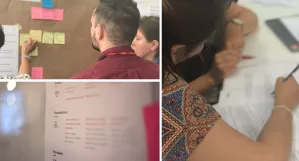- Client
- Virgin Holidays
- Sector
- Travel
- Duration
- 6 months
- What we did
- Content strategy

Having created a customer experience map for Virgin Holidays which identified how customers search for their next holiday, we’d spotted a big content opportunity – online destination pages weren’t reflecting users’ needs. We also recognised that the content creation process wasn’t as effective as it could be, and this was our opportunity to learn more about it and spot improvement areas.
Our content strategist and UX designer began an intensive content-led design sprint with designers, developers and others from Virgin Holidays, to create a new page for a key destination. This was a highly focused three-weeks with a team who hadn’t really designed in a cross-functional or user-centred way before. By the end of the sprint, we had a new page prototype to test and had learned what we wanted to know about the content process – Virgin Holidays had an unclear content process and limited writing resource, and no one team was really responsible for the final content.
With content publishers dotted around the business, but working in silos with no clear direction or strategy, we could see there was a desire to come together and work more effectively. They were ready for change, but were unsure how to make it happen. The appetite to grow their content maturity was refreshing, and we were ready to offer guidance, support and help them ensure content was an integral part of their design process.
We found it really helpful working with Clearleft. It's given us clarity and focus around content which will help us reach our business goals, and it's also given us confidence to approach content in a way that will strengthen future design work. And also they were just nice friendly people to have around and learn from!
The Results
Digital-first approach to content
Accountability and direction
The Full Story
How do you start the journey to better content?
It was important to take a collaborative approach to ensure any organisational changes we would propose could gain momentum and advocacy, so after the destination sprint we worked together to identify a small group of people eager to continue the work we’d started. These people cared about the content practice and would be champions for any new strategy and processes around the business – we dubbed them Content Champs.
We started by working with them to assess the content maturity of Virgin Holidays based on a maturity model. They identified themselves as ‘Chaotic Cowboys’ – little to no processes, no clear accountability, limited capability and no strategy. We had work to do!
To help move towards a more centrally managed approach to content, where all content is filtered through a team of experts, we needed to bring in processes, help clarify roles and responsibilities, understand the content landscape and identify priority areas to improve.
We also needed to create a strategy that would provide long-term focus and direction for any content produced, and help identify how to improve existing content. It was a tough task, and it seemed challenging with such a small team and only a few months ahead of us. But together, we knew we had a leadership team and a team of Champs keen to rise to the challenge.

With the Champs we documented ideal process flows and briefing templates – tools the teams could use to start controlling content requests. We then tested them by creating content for another new destination page – putting what we’d learned on the first sprint into place helped things run even more smoothly on the second.
The face to face usability testing we’d done during the sprints was the first time some of the team had really had first-hand exposure to their customers behaviour, and senior leaders were also eager to start putting user needs first.
For this new destination page, we’d also learned what solutions had worked well from the first sprint too, so when this page delivered a 22% uplift in click-throughs from search, it gave the whole team a new-found confidence to focus on user experience over keywords.

How do you create a clear and robust action plan?
We were keen that any strategy should be co-created with the senior stakeholders to ensure they’d be bought into it. We conducted stakeholder interviews with the senior team to understand how they viewed their current content, and what they were hoping to achieve for the business and also for users. In parallel we collated insights from user feedback onsite and looked at previous research projects to understand what users wanted from content.
We ran a series of workshops with them including a pre-mortem, which helped air some of their fears about what would happen in the future if they didn’t focus on content, with the realisation that "wait, some of this stuff is happening now!"
From the strategy workshops we were able to create a content mission and values, and identify key opportunities to improve their existing content at each stage of a customer’s journey – from researching holidays to booking. The leadership team came up with some great ideas which were fed into their digital product roadmap. This was their first clear action plan to improve content.
We also audited the most-visited site pages, judging them against criteria we’d identified, to highlight further areas for improvement or optimisation. These improvements were then added to the content roadmap, creating a strong focus for content deliverables over the next few months.

How do you improve the quality of content quickly?
Meanwhile we worked to enrich the Virgin Holidays tone of voice guidelines with content principles and best-practice tips for the current content producers. We ran workshops and coaching sessions with them to help increase the quality and consistency of what they were publishing. This would also allow them to pick up subsequent new page projects with more knowledge about how to ensure quality. These sessions also allowed us to assess the skills of the team and work out where their strengths were.
Working with the different levels of stakeholders along these two tracks was great – it meant everyone felt involved in driving the content agenda forwards and there was real enthusiasm and excitement about the work we were doing. There was no ‘top-down’ or ‘bottom-up’ challenge – everyone was on the journey.
Despite only working with the Content Champs for a few months, there was a real sense of teamwork and commitment. It would have been understandable to face some resistance to change, but the way we helped the team understand the value and impact of content meant they were enthusiastic and really collaborative.
How do you help embed and scale content?
While real momentum was gathering behind user-centred content design, we still needed to map out who should be responsible and accountable for the different types of content the business produced. So we worked with the Content Champs to map out the current content ecosystem. This was a great way to highlight the missing content roles in the business. We proposed that moving towards a centralised content team with a lead would help them to improve the quality of content and start to deliver the action plan.

The final piece of the puzzle was to create a job description and support the recruitment of a content lead. With a content strategy in place the future looks good for first-class content. They'll have the foundations and processes required to ensure Virgin Holidays continue to drive this new strategy forward in all they do, and fully embed content into the design process.